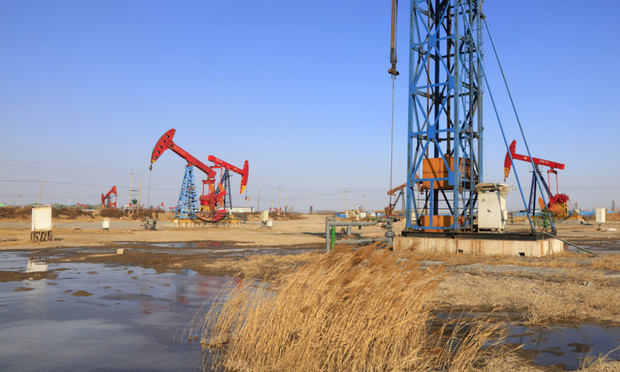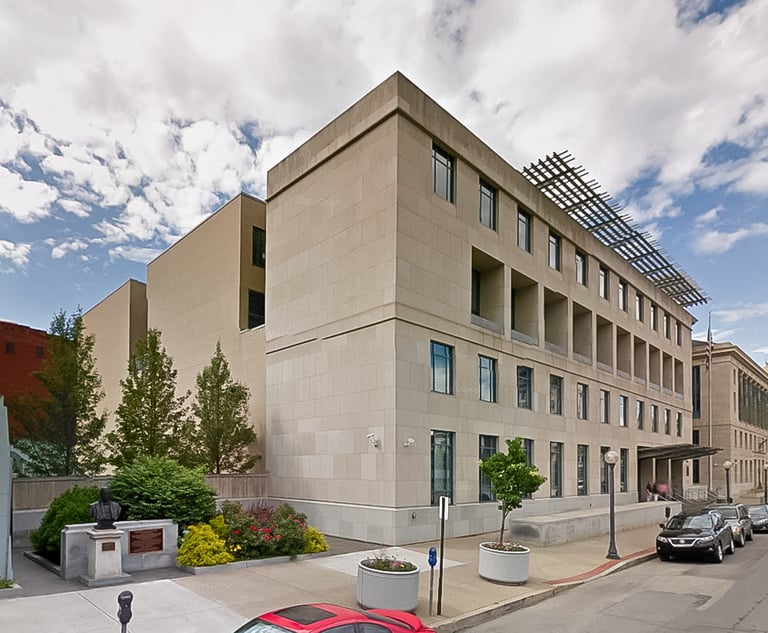Pa. High Court Deals Big Blow to Drillers in Impact Fee Case
In a decision that is likely to have costly consequences for natural gas producers in Pennsylvania, the state Supreme Court has sharply narrowed a lower court's definition of what constitutes a "stripper well"—a type of unconventional gas well that is exempt from impact fees.
January 03, 2019 at 02:28 PM
7 minute read
 Photo credit: junrong / Shutterstock.com
Photo credit: junrong / Shutterstock.com
In a decision that is likely to have costly consequences for natural gas producers in Pennsylvania, the state Supreme Court has ruled that any unconventional gas well that produces more than 90,000 cubic feet of gas per day for even just one month of a calendar year is subject to impact fees.
The high court's 6-1 Dec. 28 decision in Snyder Brothers v. Pennsylvania Public Utility Commission reversed an en banc Commonwealth Court ruling from 2017 that had reached the opposite conclusion: that a gas well's production needed only to fall to or below 90,000 cubic feet for one month out of the year in order for the well to be exempted from impact fees under Act 13.
Both the Commonwealth Court's and Supreme Court's decisions hinged on the meaning of the word “any” as it's used in Act 13's definition of “stripper well.”
Act 13 defines a “stripper well” as an “unconventional gas well incapable of producing more than 90,000 cubic feet [cf] of gas per day during any calendar month.” Stripper wells, as opposed to vertical gas wells, are not required to pay impact fees.
In Snyder, the Commonwealth Court en banc, reversing an order of the Pennsylvania Public Utility Commission, determined that the General Assembly intended “any” to mean “one,” rather than “every,” as the PUC had found. The case attracted the attention of the Pennsylvania Independent Oil and Gas Association, which was an intervenor on behalf of plaintiff Snyder Brothers Inc.
“Viewing the plain language of the statutory provision in a common sense fashion, we agree with petitioners that the word 'any' in the definition of 'stripper well' is unambiguous and it clearly and plainly means what it says—'any month,'” Judge Patricia A. McCullough wrote for the 5-2 Commonwealth Court majority in March 2017.
“Because a calendar year is a definite class consisting of 12 individual months, the most natural way to construe 'any' is to interpret it to mean at least 'one' month out of the year, no matter what or which month,” McCullough continued.
In reviewing Snyder Brothers' alternative argument—that the definition of “any” is ambiguous and because the impact fees are taxes, the term must be construed in the company's favor as a taxpayer—the court also sided with the company. The decision applied the rule of lenity, which says that when a statute is penal and its language is ambiguous, it must be construed in favor of the defendant and against the government.
“Assuming, arguendo, that 'any' is an ambiguous term, this court concludes that an analysis of the statutory construction factors does not resolve the ambiguity and that the ambiguity must be construed in favor of [Snyder Brothers],” McCullough said.
But the Supreme Court majority appeared to find a statutory construction analysis illuminating.
Justice Debra Todd, penning the majority opinion, said impact fees are not taxes, but are instead payments made by natural gas well operators to compensate communities for the negative effects shale gas extraction has on physical infrastructure.
“Consequently, given the evident intent of the legislature that the impact fee provide an adequate and stable source of revenue for counties and municipalities to offset the adverse effects of unconventional gas well production, which, as the PUC highlights, are omnipresent and do not vary with the fluctuations in well production, a construction which best effectuates this purpose is favored,” Todd said. “Thus, an interpretation of 'any calendar month' in the definition of a stripper well, as incorporated into the definition of 'vertical gas well,' to mean 'each and every' calendar month during the reporting year is most consonant with this purpose, as it relieves producers of the obligation to pay the fee only if their well or wells produce 90,000 cubic feet per day or less of natural gas for each and every calendar month of the year. As the PUC argues, this will result in more producers paying the impact fee—exactly what the General Assembly intended.”
Todd also agreed with the PUC that accepting the plaintiffs' interpretation “would permit well operators who have enjoyed robust production from their wells for the majority of a calendar year to avoid paying the impact fees to the municipalities merely because of the happenstance of one month's diminished production.”
Todd's majority opinion was joined in full by Chief Justice Thomas Saylor and Justices Christine Donohue and Kevin Dougherty. Justices David Wecht and Max Baer concurred in the result and Justice Sallie Updyke Mundy dissented.
Wecht, in a concurring opinion joined by Baer, said he agreed with the majority's ruling but questioned its heavy reliance on Act 13's legislative history and prior legislative and administrative interpretations of the statute.
“Statutory interpretation is an important part of the work that we do,” he said. ”We do not subcontract that interpretive enterprise to administrative agencies.”
Mundy, in a dissenting opinion, said she did not believe the word “any” in the definition of “stripper well” was ambiguous at all.
“Had the legislature intended the construction the majority adopts, it easily could have drafted the provision differently using the words the majority engrafts onto the definition: 'An unconventional gas well incapable of producing more than 90,000 cubic feet of gas per day during each and every calendar month…,'” Mundy said.
Mundy also said the majority failed to give proper weight to the word “incapable” in that definition.
“The majority's construction assumes that if a well produces 90,000 cubic feet of gas in one month, it is capable of producing the same amount each and every month,” Mundy said. “This assumption reads the 'incapable' requirement out of the definition and is contrary to the principles of statutory construction.”
Kevin Moody, PIOGA's general counsel, said in an email that the organization plans to ask the Supreme Court to reconsider its decision, in part because of the majority's failure to appreciate the importance of the word “incapable.”
“The notion the court accepted—that our interpretation would incentivize producers to lower production for one month after 11 months of 'robust' production—ignores perhaps the most critical word in the stripper well definition—except for 'any,' as this litigation has shown—which is 'incapable,'” Moody said, adding that PIOGA also intends to argue that PUC's argument in the litigation was contrary to the legal rationale it put forth in its original impact fee implementation orders and its impact fee notice of proposed rulemaking.
Brandon Coneby of Dinsmore & Shohl in Pittsburgh, who represented Snyder Brothers, could not be reached for comment.
A spokesman for the PUC provided a window into how much money was at stake in the case.
“Commission staff is currently working to generate invoices for producers who have disputed and not paid impact fees based on the Snyder Brothers litigation, and we estimate that the recent Pa. Supreme Court decision will involve hundreds of wells with outstanding impact fees totaling millions of dollars,” the spokesman said in an email. “There are approximately 17 producers with varying number of wells and reporting years that owe impact fees for 'stripper well' activity. At this time, we do not have a final total, but those figures will become clearer in the coming weeks as invoices are generated and payments are collected from these disputed wells.”
(Copies of the 56-page opinion in Snyder Brothers v. Pennsylvania Public Utility Commission, PICS No. 19-0001, are available at http://at.law.com/PICS.)
This content has been archived. It is available through our partners, LexisNexis® and Bloomberg Law.
To view this content, please continue to their sites.
Not a Lexis Subscriber?
Subscribe Now
Not a Bloomberg Law Subscriber?
Subscribe Now
NOT FOR REPRINT
© 2025 ALM Global, LLC, All Rights Reserved. Request academic re-use from www.copyright.com. All other uses, submit a request to [email protected]. For more information visit Asset & Logo Licensing.
You Might Like
View All
Middle District of Pennsylvania's U.S. Attorney Announces Resignation
2 minute read
High Court Revives Kleinbard's Bid to Collect $70K in Legal Fees From Lancaster DA
4 minute read
Immunity for Mental Health Care and Coverage for CBD: What's on the Pa. High Court's November Calendar
5 minute read
Slip-and-Fall Suit Cleared to Proceed Against Kalahari Indoor Waterpark
3 minute readTrending Stories
- 1We the People?
- 2New York-Based Skadden Team Joins White & Case Group in Mexico City for Citigroup Demerger
- 3No Two Wildfires Alike: Lawyers Take Different Legal Strategies in California
- 4Poop-Themed Dog Toy OK as Parody, but Still Tarnished Jack Daniel’s Brand, Court Says
- 5Meet the New President of NY's Association of Trial Court Jurists
Who Got The Work
J. Brugh Lower of Gibbons has entered an appearance for industrial equipment supplier Devco Corporation in a pending trademark infringement lawsuit. The suit, accusing the defendant of selling knock-off Graco products, was filed Dec. 18 in New Jersey District Court by Rivkin Radler on behalf of Graco Inc. and Graco Minnesota. The case, assigned to U.S. District Judge Zahid N. Quraishi, is 3:24-cv-11294, Graco Inc. et al v. Devco Corporation.
Who Got The Work
Rebecca Maller-Stein and Kent A. Yalowitz of Arnold & Porter Kaye Scholer have entered their appearances for Hanaco Venture Capital and its executives, Lior Prosor and David Frankel, in a pending securities lawsuit. The action, filed on Dec. 24 in New York Southern District Court by Zell, Aron & Co. on behalf of Goldeneye Advisors, accuses the defendants of negligently and fraudulently managing the plaintiff's $1 million investment. The case, assigned to U.S. District Judge Vernon S. Broderick, is 1:24-cv-09918, Goldeneye Advisors, LLC v. Hanaco Venture Capital, Ltd. et al.
Who Got The Work
Attorneys from A&O Shearman has stepped in as defense counsel for Toronto-Dominion Bank and other defendants in a pending securities class action. The suit, filed Dec. 11 in New York Southern District Court by Bleichmar Fonti & Auld, accuses the defendants of concealing the bank's 'pervasive' deficiencies in regards to its compliance with the Bank Secrecy Act and the quality of its anti-money laundering controls. The case, assigned to U.S. District Judge Arun Subramanian, is 1:24-cv-09445, Gonzalez v. The Toronto-Dominion Bank et al.
Who Got The Work
Crown Castle International, a Pennsylvania company providing shared communications infrastructure, has turned to Luke D. Wolf of Gordon Rees Scully Mansukhani to fend off a pending breach-of-contract lawsuit. The court action, filed Nov. 25 in Michigan Eastern District Court by Hooper Hathaway PC on behalf of The Town Residences LLC, accuses Crown Castle of failing to transfer approximately $30,000 in utility payments from T-Mobile in breach of a roof-top lease and assignment agreement. The case, assigned to U.S. District Judge Susan K. Declercq, is 2:24-cv-13131, The Town Residences LLC v. T-Mobile US, Inc. et al.
Who Got The Work
Wilfred P. Coronato and Daniel M. Schwartz of McCarter & English have stepped in as defense counsel to Electrolux Home Products Inc. in a pending product liability lawsuit. The court action, filed Nov. 26 in New York Eastern District Court by Poulos Lopiccolo PC and Nagel Rice LLP on behalf of David Stern, alleges that the defendant's refrigerators’ drawers and shelving repeatedly break and fall apart within months after purchase. The case, assigned to U.S. District Judge Joan M. Azrack, is 2:24-cv-08204, Stern v. Electrolux Home Products, Inc.
Featured Firms
Law Offices of Gary Martin Hays & Associates, P.C.
(470) 294-1674
Law Offices of Mark E. Salomone
(857) 444-6468
Smith & Hassler
(713) 739-1250





